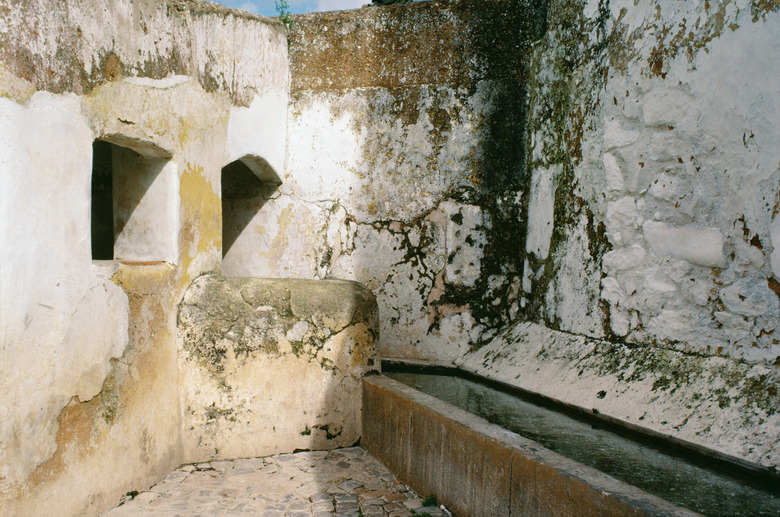How Does Weathering Happen?
Weathering is the breakdown of rocks and minerals "in situ," meaning it occurs without major movement of the rock materials. Weathering happens through processes or sources in the environment, including events like wind and objects like the roots of plants. Weathering is either mechanical, in which rocks are broken down through an external force, or chemical, which means rocks are broken down through a chemical reaction and change.
Exfoliation
Exfoliation
Mechanical weathering results from pressure from an external, physical force, such as heat or friction. Heat weathering is dominant in cold and dry climates, such as the desert. During the day in deserts, the temperature can rise to over 40 degrees Celsius (100 degrees Fahrenheit), but temperatures can cool to 5 degrees Celsius (41 degrees Fahrenheit) or below at night. When the weather is warmer, the rocks expand, and the outer layers contract and get smaller as the temperature cools. The layers of the rock continue to get weaker through this process, and slabs fall off in a process called exfoliation. Wind can also cause rocks to break into smaller pieces by applying force in crevices and scouring out bits of rock.
Freeze-Thaw Weathering
Freeze-Thaw Weathering
Another common type of mechanical weathering is freeze-thaw weathering, which happens when weather fluctuates above and below 0 degrees Celsius (32 degrees Fahrenheit). Water flows into the cracks in rocks, but when it freezes, the water crystallizes into a hexagonal form, which takes more space than liquid water, according to the HyperPhysics site maintained at Georgia State University. During the day, the ice will thaw and refreeze again when the temperature drops. This process widens the cracks in rocks and eventually breaks them apart.
Chemical Weathering
Chemical Weathering
Chemical weathering refers to the process by which rocks break down through chemical reactions; this weathering happens on a molecular level. This type of weathering causes rocks to decompose and occurs most often in warm and humid climates. All rainfall contains carbonic acid, which chemically reacts with the calcium carbonate in rocks like chalk and limestone through a process called carbonation. The rock becomes soluble in water, so the rock gradually dissolves as rain falls on it. Rocks that contain iron minerals oxidize, or rust, which chemically changes the structure of the rock and causes it to break apart.
Biological Weathering
Biological Weathering
Biological weathering combines both mechanical and chemical weathering and is caused by plants or animals. As plant roots grow deeper to find sources of water, they push through cracks in rocks, applying force to push them apart. As the roots grow, the cracks become larger and break the rocks into smaller pieces. When plants die, they produce acid as they decompose, causing a chemical reaction in the rock that further dissolves parts of rocks. Essentially plants can make their own soil in this way, allowing the crumbling crack to be more hospitable to the next seed that lodges there. Animals, including humans, can also cause biological weathering through frequent movement over a rock. This friction wears away bits of surface material.
Cite This Article
MLA
Batema, Cara. "How Does Weathering Happen?" sciencing.com, https://www.sciencing.com/weathering-happen-4066/. 24 April 2017.
APA
Batema, Cara. (2017, April 24). How Does Weathering Happen?. sciencing.com. Retrieved from https://www.sciencing.com/weathering-happen-4066/
Chicago
Batema, Cara. How Does Weathering Happen? last modified August 30, 2022. https://www.sciencing.com/weathering-happen-4066/
